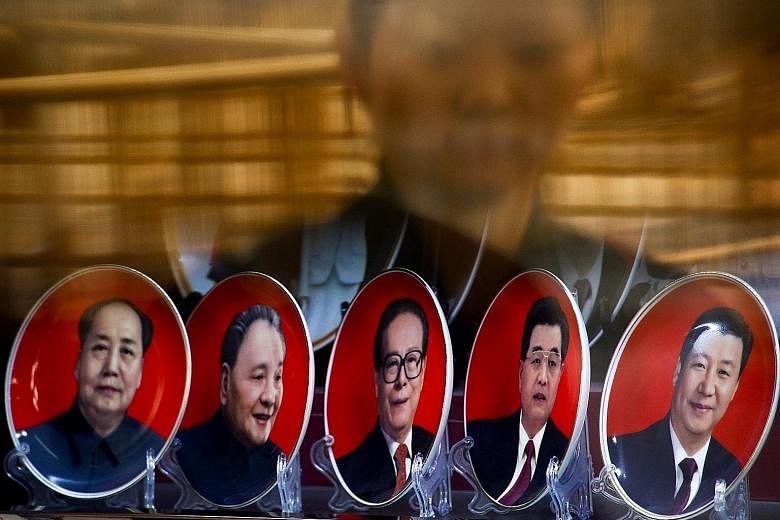BEIJING • A senior Chinese Communist Party (CCP) official has dismissed as "pure folklore" a retirement rule widely used to predict Chinese leadership changes, calling into question key assumptions about who will step down after President Xi Jinping's reshuffle next year.
Mr Deng Maosheng, a director at the Central Policy Research Office, said at a press briefing on Monday that retirement rules for senior officials needed to be flexible and revised if circumstances required.
He was responding to a question about "seven up, eight down", shorthand for the party's convention of retiring officials aged 68 or older from the Politburo's supreme Standing Committee. "The strict boundaries of 'seven up, eight down' don't exist," said Mr Deng, who has taken part in the drafting of all four plenum communiques issued under Mr Xi. "This is something from folklore, and cannot be trusted."
The remarks add uncertainty to personnel moves at the party's twice-a-decade congress in late 2017, since the rule underpins expectations that five of the current seven Standing Committee members will step aside.
The absence of such a guideline would also lift one perceived barrier to Mr Xi, 63, staying in the party's topmost echelon after two terms as general secretary in 2022.
Mr Deng, whose office is overseen by Mr Wang Huning, one of Mr Xi's top policy advisers, was speaking about the communique issued last Thursday at the conclusion of an annual party meeting.
The document announced that Mr Xi had been officially designated as the party's "core" leader, a status that is expected to give him greater authority to push his agenda and promote favoured officials.
"In terms of selecting and promoting important leaders, there are strict organisational rules and sufficient democratic processes, but they are also subject to adjustment according to actual situations," Mr Deng said, without addressing the circumstances of specific leaders.
Still, he said top leaders needed some sort of retirement age, ruling out the prospect of "life tenure".
It is rare for party officials to acknowledge discussion of the "seven up, eight down" guideline.
Professor Wang Yukai of the Chinese Academy of Governance, a state-run think-tank, said the "unwritten rule" dates to around 2002, when then President Jiang Zemin asserted it while the Standing Committee was being shaped.
The Standing Committee is the inner sanctum of Chinese political power and its membership usually includes the president, premier, the national legislature chief and other top leaders. The convention of excluding any member 68 or older has been kept for 15 years.
Observers of China's politics often speculate whether Mr Xi might use his new authority to bend conventions at the congress and prolong the careers of ageing allies. For example, Mr Wang Qishan, who oversees Mr Xi's anti-corruption campaign, is 68. "What I'll be looking for at the 19th Party Congress is nothing original with me," said political science professor Andrew Nathan at Columbia University who studies Chinese politics. "I'll want to see whether Wang Qishan stays, breaking the seven up, eight down rule, and whether an heir apparent emerges or not, with the lack of an heir apparent increasing the signalling that Xi will serve a third term."
Age is not the only barrier preventing Mr Xi from staying on. Another is the principle of collective leadership, which the party has stressed for more than three decades to prevent a repeat of Mao Zedong's personality cult.
Last week's communique reaffirmed the commitment to collective leadership, saying the practice "must always be followed and should not be violated by any organisation or individual under any circumstance or for any reason".
Mr Deng said retirement ages represented "ageism" and the party needed a more nuanced approach. "The matter of age needs to be flexibly handled, and it doesn't have to be a set standard."
BLOOMBERG

